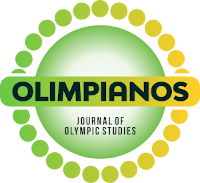Correr en la naturaleza como elemento importante de la medicina del estilo de vida: motivaciones y actitudes ambientales de corredores modernos y turistas deportivos
Palabras clave:
correr, motivaciones, naturaleza, satisfacción con la vida, turismo deportivoResumen
Objetivo del estudio es identificar la motivación y actitudes de los participantes en eventos de carrera celebrados fuera de la ciudad y su perfil sociodemográfico. Se entrevistó personalmente a 107 participantes de la carrera deportiva Warta Challenge celebrada en la Voivodato, Polonia. Los resultados del estudio revelaron que, a las carreras masivas, organizadas fuera de una gran ciudad, asisten con mayor frecuencia hombres jóvenes y de mediana edad, de grandes ciudades, con educación superior y profesionalmente activos. Los participantes del Warta Challenge participan regularmente en eventos de carrera. Les motiva a participar en el maratón, mejora su calidad de vida, no tanto por los resultados deportivos conseguidos, sino por el contacto con la naturaleza y con otras personas. Más del 80% de los encuestados prefiere correr fuera de la ciudad. Sobre todo, aprecian la ausencia de aglomeraciones en sus rutas para correr, rodeados de naturaleza.
Descargas
Citas
Marry LC, Ely MR. Effect of air pollution on marathon running performance. Med. sci. Sports Exerc. 2010;42:585-591.
Weichenthal S, Hatzopoulou M, Goldberg M. Exposure to traffic-related air pollution during physical activity and acute changes in blood pressure, autonomic and micro-vascular function in women: A cross-over study. Part. Fiber Toxicol. 2014;11:70.
World Tourism Organization & United Nations Environment Program. Guidelines: Development of National Parks and Protected Areas for Tourism. 1992.
Malchrowicz-Mosko E, Botikova Z, Poczta J. Because we don't want to run in Smog: problems with the sustainable management of sport event tourism in protected areas (A case study of National Parks in Poland and Slovakia). Sustainability. 2019;11(2):325.
Bodin M, Hartig T. Does the outdoor environment matter for psychological restoration gained through running? Psycho. Sports Exerc. 2003;4:141-153.
Nowak F. Mass sports and recreation events as effective instruments of health-oriented education. Journal of Physical Education and Health. 2012;2(3):31-37.
Brymer E, Gray T. Dancing with nature: rhythm and harmony in extreme sport participation. J. Adventure Educ. Outdoor Learning. 2009;9:135-149.
Brymer E, Gray T. Developing an intimate “relationship” with nature through extreme sports participation. Leisure/Loisir. 2011;34:361-374.
Gladwell W, Brown KD, Wood C. The great outdoors: how a green exercise environment can benefit all. Extrem. Physiol. Med. 2013;2(3):1-7.
Ólafsdóttir R et al. Running wild: environmental attitudes of long-distance runners in the Icelandic Highlands, Mountain Research and Development. 2021;41(3):32-39.
Bodin M, Harting T. Does the outdoor environment matter for psychological restoration gained through running? Psycho. Sports Exerc. 2003;4:141-153.
Deelen I. et al. Attractive running environments for all? A cross-sectional study on physical environmental characteristics and runners’ motives and attitudes, in relation to the experience of the running environment, BMC Public Health. 2019;19:366.
Melo R, Van Rheenen D, Gammon SJ. Part I: nature sports: a unifying concept, Annals of Leisure Research. 2000;23(1):1-18.
Rozmiarek et al., Motivation and eco-attitudes among night runners during the COVID-19 Pandemic. Sustainability; 2022;14:1512.
Descargas
Publicado
Número
Sección
Licencia
Derechos de autor 2024 Olimpianos - Journal of Olympic Studies

Esta obra está bajo una licencia internacional Creative Commons Atribución-NoComercial-CompartirIgual 4.0.
Los autores autorizan a otros a copiar y redistribuir el material en cualquier medio o formato. Remezcla, transforma y crea a partir del material. No puede utilizar el material con fines comerciales.






